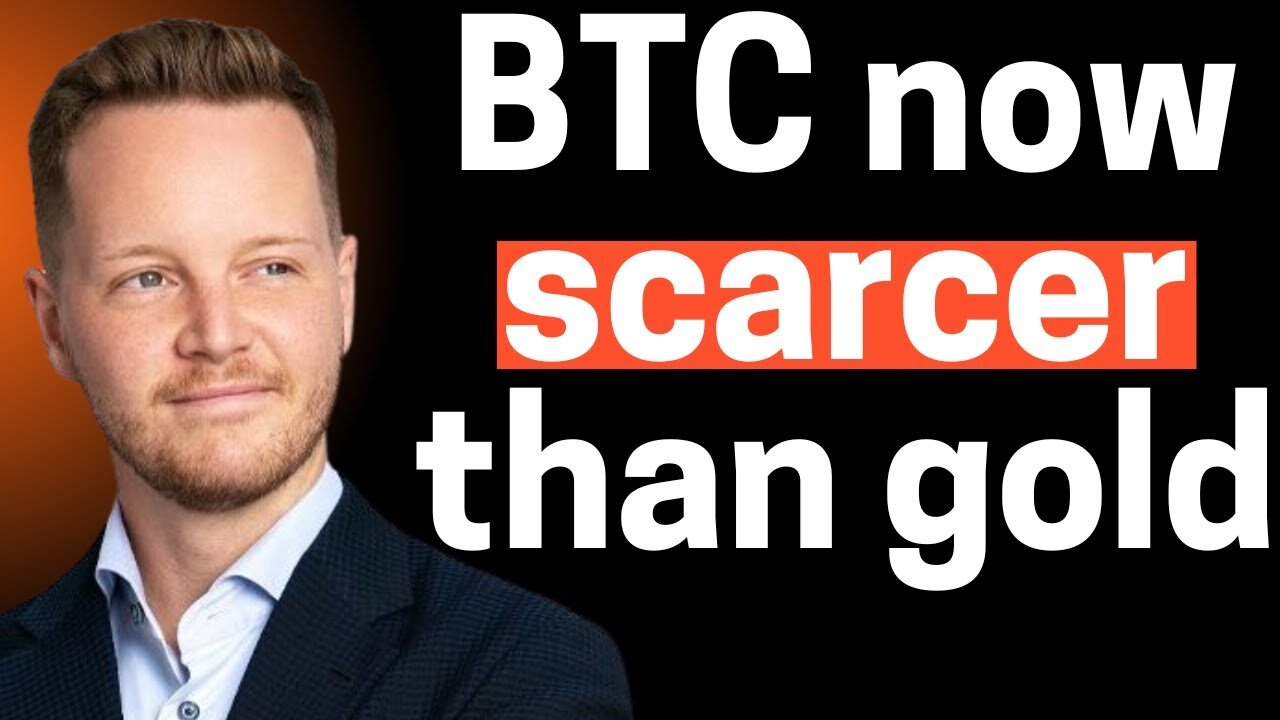Premium Only Content

Bitcoin demand higher than expected | Ulrik Lykke
Bitcoin is now officially the most scarce asset on planet Earth. ETF demand is higher than most expected, and we are experiencing a war on Privacy.
Where to store your Bitcoin? I personally use a BitBox!
- Get a 5% Discount with code "ROBIN"
- & visit: https://robinbtc.link/bitbox
Ever visited the best Bitcoin-only conference? Come join me at BTC Prague!
- Get a 10% discount with code "ROBIN"
- & visit: https://robinbtc.link/Prague
Where to buy Bitcoin? I personally use 21bitcoin!
- Save fees with my code "ROBIN"
- & visit: https://robinbtc.link/21bitcoin
Best place to back up your seed phrase:
- Get a 10% discount with code "Robin"
- & visit: https://robinbtc.link/xellox
Guest's contact: https://twitter.com/ulriklykke
Summary
In this conversation, Ulrik and Robin discuss various topics related to Bitcoin, including the recent halving, the impact of ETFs, the future of self-custody, the role of Coinbase as a custody provider, and the regulatory landscape. Ulrik emphasizes the significance of Bitcoin's pre-programmed monetary policy and its ability to run smoothly without external influence. He believes that ETFs will have a greater impact on price development than the halving event. Ulrik also discusses the potential for increased adoption of Bitcoin by publicly traded companies and the challenges of self-custody. He predicts that volatility will decrease over time and that regulatory frameworks will continue to evolve as regulators try to keep up with the innovation in the crypto space. The conversation covers various topics related to digital assets, regulation, privacy, and the adoption of Bitcoin. Ulrik discusses the challenges regulators face in classifying digital assets and the potential impact on self-custody solutions. He also expresses his surprise at the slow adoption of Bitcoin and the need for a tipping point. The conversation touches on El Salvador's adoption of Bitcoin and the potential for other countries to follow suit. Ulrik concludes by highlighting the importance of asking high-quality questions.
Takeaways
Bitcoin's pre-programmed monetary policy and its ability to run smoothly without external influence is a significant feature of the asset.
ETFs are expected to have a greater impact on Bitcoin's price development than the halving event.
Increased adoption of Bitcoin by publicly traded companies is still in its early stages, and holding Bitcoin as an asset on balance sheets is yet to be widely adopted.
The future of self-custody may involve hybrid solutions that allow users to store their Bitcoin through a platform while still being responsible for their private keys.
Coinbase's position as a custody provider for ETFs poses a potential risk, and competition in the custody space may lead to lower fees and diversification among custody providers.
Volatility is a characteristic of Bitcoin that works in favor of long-term investors, but it may deter some individuals from entering the market.
Regulatory frameworks for cryptocurrencies are evolving, and regulators are playing catch-up with the innovation in the crypto space.
The introduction of central bank digital currencies (CBDCs) may impact the regulatory landscape and how cryptocurrencies are categorized. Not all digital assets are born equal, and regulators struggle to classify them.
The slow adoption of Bitcoin has been surprising, and a tipping point is yet to be reached.
El Salvador's adoption of Bitcoin is a bold move that could inspire other countries.
Asking high-quality questions is crucial for gaining a deeper understanding.
Chapters
00:00 The Rise of Remote Podcasting
07:35 The Impact of Bitcoin ETFs on Institutional Adoption
23:47 The Risk of Coinbase as a Honeypot
29:41 Understanding Volatility in Bitcoin
36:19 The Regulatory Landscape of Bitcoin
48:30 The Slow Adoption of Bitcoin
01:03:29 El Salvador's Adoption of Bitcoin
-
 LIVE
LIVE
Vigilant News Network
12 hours agoBUSTED: O’Keefe Exposes Secret Pentagon Plot to Sabotage Trump’s Return | The Daily Dose
1,673 watching -
 LIVE
LIVE
Game On!
12 hours agoTaylor Swift SHOCKS Chief fans! Does NOT want Travis Kelce to retire!
890 watching -
 4:27
4:27
Reforge Gaming
12 hours agoTHIS will not save Ubisoft.
15.2K5 -
 7:35
7:35
Tactical Advisor
1 day agoNEW Springfield Prodigy Compact (FIRST LOOK)
43.9K4 -
 16:45
16:45
IsaacButterfield
1 day ago $4.72 earnedWoke TikToks Are DESTROYING The World
23.1K28 -
 1:09:27
1:09:27
State of the Second Podcast
16 hours agoThis is Why We Don’t Trust Politicians (ft. @stones2ndsense)
20.6K3 -
 10:19
10:19
Chrissy Clark
13 hours agoCNN’s BILLION Dollar Defamation Trial
10.6K7 -
 1:00:27
1:00:27
Trumpet Daily
20 hours ago $4.82 earnedCongress Humiliates Itself - Trumpet Daily | Jan. 15, 2025
12.7K15 -
 1:49:46
1:49:46
Glenn Greenwald
1 day agoTrump Fosters A Peace Deal With Israel & Gaza; Trump's Pressure On Israel Embarrasses His Enemies & Provides Foreign Policy Clues; Rubio & Hegseth On War And Militarism | SYSTEM UPDATE #389
128K186 -
 1:28:46
1:28:46
Donald Trump Jr.
20 hours agoOut of this World: Breaking News Investigation on Secret Alien Aircrafts, Live with Ross Coulthart & Lue Elizondo | TRIGGERED Ep.207
333K489